Nerine Dorman's Blog, page 83
April 1, 2013
Mummies in Newcastle upon Tyne
 Icy Sedgwick is one of my favourite people. Not only do we share a love for the written word, but we agree that ancient Egyptians, and mummies in particular, make fascinating people with whom to have tea. Of course Icy gets more time to visit with our old friends than I do, so today I'm handing over my blog to her so she can chat about her most recent expedition.
Icy Sedgwick is one of my favourite people. Not only do we share a love for the written word, but we agree that ancient Egyptians, and mummies in particular, make fascinating people with whom to have tea. Of course Icy gets more time to visit with our old friends than I do, so today I'm handing over my blog to her so she can chat about her most recent expedition.* * * *
Newcastle upon Tyne, in the cold north east of England, is perhaps one of the more unlikely places to find a mummy, but here at the Great North Museum (formerly the Hancock Museum), we have not one mummy, but two. The Egyptian Gallery in the newly refurbished museum houses a plethora of artefacts, including jewellery, scrolls, funerary ephemera, and a large statue of Sekhmet.
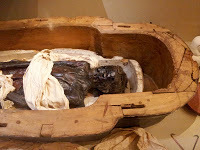 Our younger mummy is Irtyru; she dates to between 664-525 BC, and she was found at Qurneh on the west bank of the Nile near Thebes. Scientists believe she was between 30 and 35 when she died. She was sold at auction in 1825 and then donated to the Literary and Philosophical Society. Unfortunately, the Victorians didn't have access to modern scientific methods of investigation, and she was unwrapped in 1830. She was varnished to preserve her, which explains her skin colour, and her original wrappings and organs are long since lost. I can't help feeling sorry for her, missing as she is her internal organs and those amulets lodged within her wrappings, but she does has a habit of firing the imaginations of those youngsters who come to visit.
Our younger mummy is Irtyru; she dates to between 664-525 BC, and she was found at Qurneh on the west bank of the Nile near Thebes. Scientists believe she was between 30 and 35 when she died. She was sold at auction in 1825 and then donated to the Literary and Philosophical Society. Unfortunately, the Victorians didn't have access to modern scientific methods of investigation, and she was unwrapped in 1830. She was varnished to preserve her, which explains her skin colour, and her original wrappings and organs are long since lost. I can't help feeling sorry for her, missing as she is her internal organs and those amulets lodged within her wrappings, but she does has a habit of firing the imaginations of those youngsters who come to visit.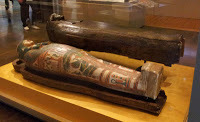 Our other mummy is Bakt en Hor, known as 'The Lady'. She lived between 1070 and 713 BC in Gourneh, Thebes, and CT scanning tells us she was between 21 and 35 when she died. She also had a full set of teeth, and her bones show no signs of bone disease. She was bought in Egypt in 1820, and donated to the Literary and Philosophical Society. However, Bakt en Hor was the subject of a mystery until recently. All of her documentation cited her name as being Bakt hor Nekht, translated as meaning 'Servant of Horus the Strong', even as recently as 2008 while she was temporarily on display at Segedenum, our Roman fort at the end of Hadrian’s Wall. A team of specialists decided to investigate further, although the investigation was operating under the caveat that her coffin was not to be opened, and physical samples were not to be taken. Luckily technology has moved on sufficiently that CT scans can tell researchers so much without mummies needing to be examined.
Our other mummy is Bakt en Hor, known as 'The Lady'. She lived between 1070 and 713 BC in Gourneh, Thebes, and CT scanning tells us she was between 21 and 35 when she died. She also had a full set of teeth, and her bones show no signs of bone disease. She was bought in Egypt in 1820, and donated to the Literary and Philosophical Society. However, Bakt en Hor was the subject of a mystery until recently. All of her documentation cited her name as being Bakt hor Nekht, translated as meaning 'Servant of Horus the Strong', even as recently as 2008 while she was temporarily on display at Segedenum, our Roman fort at the end of Hadrian’s Wall. A team of specialists decided to investigate further, although the investigation was operating under the caveat that her coffin was not to be opened, and physical samples were not to be taken. Luckily technology has moved on sufficiently that CT scans can tell researchers so much without mummies needing to be examined.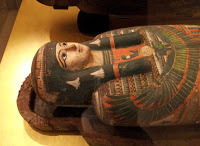 As part of her research, Egyptologist Gill Scott paid a visit to the Literary and Philosophical Society, a somewhat impressive library located near Newcastle's Central Station, and by chance discovered a volume entitled 'The Reports, Papers and Catalogues of the Literary and Philosophical Society, 1820-1821'. The handwritten volume contained newspaper articles and other items, one of which was a scrap of the original wrappings from none other than Bakt en Hor. Archaeological chemist Dr Stephen Buckley subjected the scrap to chemical analysis, and discovered that extreme heat and cheap materials had been used during the embalming process, implying a hurried or incompetent job. A CT scan allowed them to recreate her head, and the high levels of decomposition to her face confirmed this theory.
As part of her research, Egyptologist Gill Scott paid a visit to the Literary and Philosophical Society, a somewhat impressive library located near Newcastle's Central Station, and by chance discovered a volume entitled 'The Reports, Papers and Catalogues of the Literary and Philosophical Society, 1820-1821'. The handwritten volume contained newspaper articles and other items, one of which was a scrap of the original wrappings from none other than Bakt en Hor. Archaeological chemist Dr Stephen Buckley subjected the scrap to chemical analysis, and discovered that extreme heat and cheap materials had been used during the embalming process, implying a hurried or incompetent job. A CT scan allowed them to recreate her head, and the high levels of decomposition to her face confirmed this theory.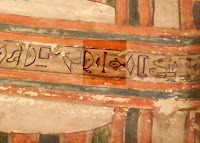 Further investigation revealed a mistake in naming her. Hieroglyphs expert Alan Fildes noticed a hurried water sign near the bottom of her cartonnage, which had been mistranslated, giving her the name of Bakt hor Nekht. Translated correctly, the name should read Bakt en Hor, and her true name has finally been restored after two hundred years of error. No one knows if her name was written so badly as part of the rush job surrounding her embalming and burial, but I'm quite glad that she's now known by her real name, rather than the wrong one. Before the museum's refurbishment, the old Egyptian gallery also featured a video in which visitors could watch as the CT scan of her skull was used to recreate her face, and the resulting image was one of a beautiful and strong woman. Sadly this video, or image, is no longer in the museum, replaced instead by the History Channel's short video about the investigation into her name.
Further investigation revealed a mistake in naming her. Hieroglyphs expert Alan Fildes noticed a hurried water sign near the bottom of her cartonnage, which had been mistranslated, giving her the name of Bakt hor Nekht. Translated correctly, the name should read Bakt en Hor, and her true name has finally been restored after two hundred years of error. No one knows if her name was written so badly as part of the rush job surrounding her embalming and burial, but I'm quite glad that she's now known by her real name, rather than the wrong one. Before the museum's refurbishment, the old Egyptian gallery also featured a video in which visitors could watch as the CT scan of her skull was used to recreate her face, and the resulting image was one of a beautiful and strong woman. Sadly this video, or image, is no longer in the museum, replaced instead by the History Channel's short video about the investigation into her name.As fascinating as the Egyptian gallery is, the mummies always take centre stage, and I’m glad that these women now have their real names as they reside in this cold city that lies over 2,600 miles from their homeland.
* * * *
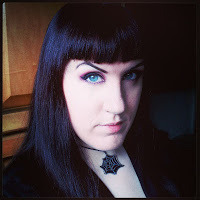 Icy Sedgwick is a writer and film academic who lives and works in Newcastle upon Tyne in the United Kingdom. She’s been fascinated by ancient Egypt since she was eight, and her next book is a retelling of The Sorceror’s Apprentice, substituting brooms for mummies. She often features mummies in her Friday flash fiction, including No Flash and Sand and Snow.
Icy Sedgwick is a writer and film academic who lives and works in Newcastle upon Tyne in the United Kingdom. She’s been fascinated by ancient Egypt since she was eight, and her next book is a retelling of The Sorceror’s Apprentice, substituting brooms for mummies. She often features mummies in her Friday flash fiction, including No Flash and Sand and Snow.
Published on April 01, 2013 02:55
March 27, 2013
In Conversation with Grey Freeman
Today Grey Freeman, one of the Something Wicked volume #2 anthology authors is stopping by for a little Q&A, so without further ado...
Tell us a little about your short story for Something Wicked volume 2.

Promises is a bitter-sweet story about a man who is visited at night by his dead fiancée who died the week before their wedding. I wanted it to be about love and sex and how the latter is one of the most profound ways to express the former. But, you know, without being all sleazy and stuff. As far as I know I succeeded. I once sent around an early draft to people in my office and included the new girl to make her feel welcome. I was worried it would freak her out! Luckily it didn't (probably saving on a trip to HR). Instead we discussed the story and sometimes we still do, though it's a lot easier now, seeing as how we live together. There are few authors, I think, who can point to a story and say, that one got me the love of my life!
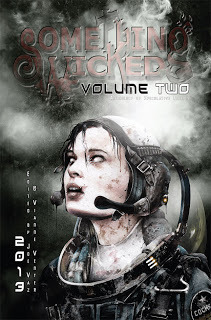 What gets you writing? Tell us a little bit more about your approach.
What gets you writing? Tell us a little bit more about your approach.
I love telling stories and you eventually have to stop letting your imagination run away with you, stop babbling things that don't make sense to anyone else and commit them to paper. I write an hour in the morning before
work and an hour after. Then I do six hours over the weekend. First draft is when I'm striking out into the wilderness with a handful of ideas and characters. Then once I've covered the ground and found out what the story was about I go back and refine everything so that it's all pointing in the right direction. Characters first and foremost are key. If the reader doesn't like your characters then they won't care about the story.
What do you think are particular challenges associated with short stories as a form? As for longer works, do you have anything planned?
With short stories you need to be precise, you need to get to the point as soon as possible while still allowing some room for the reader to get into the narrative, getting to know the character and appreciate his or her dilemma. So many things are about context and you need to be very quick to the point of emotional short-hand to get that across in 5,000 words. You have a bit more luxury to take your time with a novel.
Speaking of novels, I've just swept the ashes of my last attempt from the desk. It went around agents and though it got a little interest, sadly, it didn't get enough. I'm now working on a new one that's currently called End of the Line (that will definitely change). It's a supernatural thriller and I've set myself the challenge of having it mostly set in a single room. It's shaping up well so far, I have a literary agent still interested in me from the last endeavour and I'm off for coffee with an editor who's worked on quite a best-sellers in his time to discuss it. It's scaring the pants off me!
What's the one short story or novel you keep going back to (we all have them), and what makes it stand out above all the rest?
The book that immediately springs to mind for me is A Big Boy Did it and Ran Away by Christopher Brookmyre. On the surface its a thriller of an everyman against terrorists but Brookmyre is happy to break the rules and spends entire chapters outlining each major character's life story but he does it with such wit and charm that you can't help but be swept along. The theme of the story essentially rails against the 'ordinary' life. Why be a family man with a wife and screaming baby when you could be a secret agent? By the finale, you're about to give up your day job and then the author deftly points out 'that's why' and you're suddenly super pleased to be a normal person. Love it.
What scares you?
Plenty of things. I'm scared of spending my whole life in an office, either never having a book published or having a book published but never earning enough to become a full-time author, it's certainly happened to plenty of current authors. I'm also terrified of becoming a full-time author and being incredibly lonely and unhappy in it. I'm a people person! And a worrier, it seems.
Links:
My blog: http://greyfreeman.blogspot.co.uk/
My Facebook: https://www.facebook.com/GreyFreemanauthor
My Twitter: https://twitter.com/GreyFreeman
Tell us a little about your short story for Something Wicked volume 2.

Promises is a bitter-sweet story about a man who is visited at night by his dead fiancée who died the week before their wedding. I wanted it to be about love and sex and how the latter is one of the most profound ways to express the former. But, you know, without being all sleazy and stuff. As far as I know I succeeded. I once sent around an early draft to people in my office and included the new girl to make her feel welcome. I was worried it would freak her out! Luckily it didn't (probably saving on a trip to HR). Instead we discussed the story and sometimes we still do, though it's a lot easier now, seeing as how we live together. There are few authors, I think, who can point to a story and say, that one got me the love of my life!
 What gets you writing? Tell us a little bit more about your approach.
What gets you writing? Tell us a little bit more about your approach.I love telling stories and you eventually have to stop letting your imagination run away with you, stop babbling things that don't make sense to anyone else and commit them to paper. I write an hour in the morning before
work and an hour after. Then I do six hours over the weekend. First draft is when I'm striking out into the wilderness with a handful of ideas and characters. Then once I've covered the ground and found out what the story was about I go back and refine everything so that it's all pointing in the right direction. Characters first and foremost are key. If the reader doesn't like your characters then they won't care about the story.
What do you think are particular challenges associated with short stories as a form? As for longer works, do you have anything planned?
With short stories you need to be precise, you need to get to the point as soon as possible while still allowing some room for the reader to get into the narrative, getting to know the character and appreciate his or her dilemma. So many things are about context and you need to be very quick to the point of emotional short-hand to get that across in 5,000 words. You have a bit more luxury to take your time with a novel.
Speaking of novels, I've just swept the ashes of my last attempt from the desk. It went around agents and though it got a little interest, sadly, it didn't get enough. I'm now working on a new one that's currently called End of the Line (that will definitely change). It's a supernatural thriller and I've set myself the challenge of having it mostly set in a single room. It's shaping up well so far, I have a literary agent still interested in me from the last endeavour and I'm off for coffee with an editor who's worked on quite a best-sellers in his time to discuss it. It's scaring the pants off me!
What's the one short story or novel you keep going back to (we all have them), and what makes it stand out above all the rest?
The book that immediately springs to mind for me is A Big Boy Did it and Ran Away by Christopher Brookmyre. On the surface its a thriller of an everyman against terrorists but Brookmyre is happy to break the rules and spends entire chapters outlining each major character's life story but he does it with such wit and charm that you can't help but be swept along. The theme of the story essentially rails against the 'ordinary' life. Why be a family man with a wife and screaming baby when you could be a secret agent? By the finale, you're about to give up your day job and then the author deftly points out 'that's why' and you're suddenly super pleased to be a normal person. Love it.
What scares you?
Plenty of things. I'm scared of spending my whole life in an office, either never having a book published or having a book published but never earning enough to become a full-time author, it's certainly happened to plenty of current authors. I'm also terrified of becoming a full-time author and being incredibly lonely and unhappy in it. I'm a people person! And a worrier, it seems.
Links:
My blog: http://greyfreeman.blogspot.co.uk/
My Facebook: https://www.facebook.com/GreyFreemanauthor
My Twitter: https://twitter.com/GreyFreeman
Published on March 27, 2013 23:44
March 26, 2013
Single, Cool, and Fine: How to get Laid as an Ex-Teen Idol #review
Title: Single, Cool, and Fine: How to get Laid as an Ex-Teen Idol
Author: Lux Zakari
Publisher: Smashwords, 2012
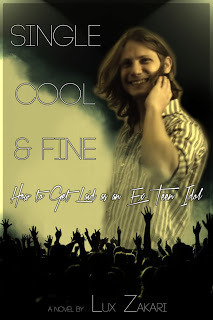 While the musicians I obsessed about as a teen were certainly not as squeaky clean as James Venora, I can certainly relate to Lux Zakari’s premise. We all had celebs we fixated on, and in Single, Cool, and Fine, Zakari paints a picture of a teen idol long after the initial wave of his success has mellowed. Plainly put, James is so out of touch with not only himself, and the world around him, that when his wife Greer leaves him, taking their two kids with him, he barely knows how to make a cup of coffee, let alone sign the divorce papers to finalise the demise of his marriage.
While the musicians I obsessed about as a teen were certainly not as squeaky clean as James Venora, I can certainly relate to Lux Zakari’s premise. We all had celebs we fixated on, and in Single, Cool, and Fine, Zakari paints a picture of a teen idol long after the initial wave of his success has mellowed. Plainly put, James is so out of touch with not only himself, and the world around him, that when his wife Greer leaves him, taking their two kids with him, he barely knows how to make a cup of coffee, let alone sign the divorce papers to finalise the demise of his marriage.What follows is a journey of self-discovery, as James tries to figure out where he stands with women—and the world. The result: sexy romps tempered with poignant self-reflection. Though finding another woman isn’t hard for James once he lives up to the idealised version of himself that exists in popular media, none of them quite measure up to what he really wants. But sometimes one has to lose something of value before you are aware of exactly how valuable it was, and that’s exactly what’s happened to James.
What can I say about Zukari’s writing that I haven’t already said in other reviews? She writes stunning three-dimensional characters who have authentic dilemmas. She has a keen perception of people and their behaviour. She is witty, and her characters’ dialogues feel like they’ve taken place in real life. And that’s what I love about her stories. I feel like I’m vicariously living the lives of her characters while they go about their journey.
Single, Cool, and Fine alternates between kink and out-and-out humour, where life ends up imitating art. We’ve all got friends whose kids behave lik
e Amie and Noah. Or annoying siblings and their friends, like Wade and E.Y. Okay, I’m probably going to wax lyrical ad nauseam here. If you’re into contemporary erotic romance that has a little more going for it on an intellectual level than just boy meets girl, they shack up, something gets them apart… You know what I mean. Go read this book. And if you don’t laugh out loud and get weird stares at some parts, then you’ve got absolutely no capacity for emotion. Thank you, Ms. Zakari, for yet another highly entertaining read.
Published on March 26, 2013 23:46
Five Minutes with CS Fuqua
Today I've got Chris Fuqua, one of the Something Wicked Volume #2 anthology authors stopping by my blog for a little Q&A. Welcome, Chris, and tell us a little about your short story for the anthology.
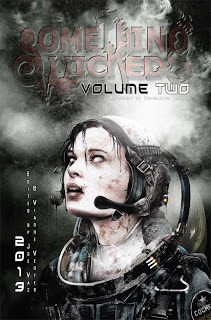 Demons is a sequel to the story Occasional Demons that featured the phooka starring in Demons. At the end of Occasional Demons, the phooka was left to deteriorate in a cage within a bricked-in, windowless room. And that’s where he stayed for more than 15 years. Then the US invaded Iraq, and troops began returning, suffering PTSD and other mental and physical problems associated with war. I then decided to use the phooka and its situation to explore several issues, from illegitimate war to political and religious hypocrisy, while working within a fragile framework of compassion that even the most wounded and tortured can maintain for others.
Demons is a sequel to the story Occasional Demons that featured the phooka starring in Demons. At the end of Occasional Demons, the phooka was left to deteriorate in a cage within a bricked-in, windowless room. And that’s where he stayed for more than 15 years. Then the US invaded Iraq, and troops began returning, suffering PTSD and other mental and physical problems associated with war. I then decided to use the phooka and its situation to explore several issues, from illegitimate war to political and religious hypocrisy, while working within a fragile framework of compassion that even the most wounded and tortured can maintain for others.What gets you writing? Tell us a little bit more about your approach.
I like to explore deeply personal issues that people face every day, issues that have wider social bearing, where ordinary persons react extraordinarily to triumph over challenges. Of course, triumph isn’t always what it seems and can even appear to be failure. Each story is a journey to find out a little more about what makes humans tick, and sometimes the best way to explore these traits is through surreal beings and settings.
What do you think are particular challenges associated with short stories as a form? As for longer works, do you have anything planned?
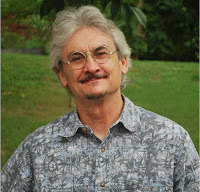 The primary challenge for me is finding publishers who are still willing to publish short works. In technical aspects of short story writing, I find the main challenge to be the inclusion of all required information while making characters real without blowing the length out of proportion. With that said, the short story and poem are my favorite forms, always challenging and forever rewarding when the challenge is met successfully. Regarding other projects, I’m working on several now, including a collection of connected stories, a nonfiction book, and a novel, with several other projects roughly outlined.
The primary challenge for me is finding publishers who are still willing to publish short works. In technical aspects of short story writing, I find the main challenge to be the inclusion of all required information while making characters real without blowing the length out of proportion. With that said, the short story and poem are my favorite forms, always challenging and forever rewarding when the challenge is met successfully. Regarding other projects, I’m working on several now, including a collection of connected stories, a nonfiction book, and a novel, with several other projects roughly outlined.What's the one short story or novel you keep going back to (we all have them), and what makes it stand out above all the rest?
It would have to be Cat’s Cradle by Kurt Vonnegut, Jr. It has everything: satire, comedy, tragedy, science fiction, horror, love, hate... It’s just about perfect in nailing society for what it is and probably always will be. Now...if I could only writing something even half as good...
What scares you?
Willful ignorance and stupidity -- rather, the effects. For example, once upon a not so short time ago, science was considered for what it is, science, an exercise based in empirical fact. Today, at least in the US, thanks to corporations, politicians, and conservative religious groups, science has been cast as a faith-based proposition rather than reality. And because of this at least partially successful attempt to make science something one “believes” or “disbelieves” as though it were a religious myth, we humans choose to deny threats that could ultimately wipe us out. We ignore the evidence day after day -- rising global temperature, melting icecaps, rise in sea level, increased greenhouse gases, mega-storms, and on and on. Science -- empirical facts -- warns us that we’re in danger. And yet, we deny the reality. We choose to be willfully ignorant, willfully foolish, willfully stupid. And that’s extremely scary.
Links:
Website: http://csfuqua.comxa.com
Twitter: https://twitter.com/csfuqua
Goodreads.com: http://www.goodreads.com/CSFuqua
Librarything.com: http://www.librarything.com/author/fuquacs
Facebook: https://www.facebook.com/C.S.Fuqua.Author
Bio:
CS Fuqua’s books include Rise Up, Big Daddy’s Gadgets, If I Were... (children’s poems), Alabama Musicians: Musical Heritage from the Heart of Dixie, Trust Walk, The Swing: Poems of Fatherhood, and Notes to My Becca , among others. His work has appeared in publications as diverse as The Christian Science Monitor, Naval History, Main Street Rag, and Year's Best Horror Stories. Please visit http://csfuqua.comxa.com.
Published on March 26, 2013 00:32
March 25, 2013
Keep Your Hands Flat... by Sylvia Shults
Today I hand over the reins to Sylvia Shults... And she's talking about dinosaurs. And other stuff. But go check out her website here already. Then sit back and be prepared to be entertained.
* * * *
When I was a little girl, I had lots of interests. That was just a product of being an early and voracious reader. Like many girls, I was completely horse crazy. And like even more children, I was totally, hopelessly, head over heels wild for dinosaurs.
I’ve mostly (okay, somewhat) outgrown the horse-craziness. Don’t get me wrong, I still love horses, but not with the all-consuming adoration I did when I was six. (And seven. And eight. And … okay, I’ll stop there.)
But I’m still thoroughly loony for dinosaurs.
If anything, my dino-lust is even stronger now than when I was a kid. Back in the day, you just had a few books – the How & Why Wonder Book was my fave – with the basic heavy hitters: Triceratops, Stegosaurus, Brontosaurus (this was before brontos were declared an un-dinosaur and replaced with Apatosauruses), and of course, everybody’s favorite carnivore, Tyrannosaurus Rex. You just knew he was cool because he was the only dino that merited two names. Even though I would never admit it (you were supposed to like the plant-eaters, not the meat-eaters), T-Rex was secretly my favorite. I remember watching Land of the Lost on Saturday mornings, and at the end of the opening credits, when the T-Rex chased the humans into the cave – anybody else remember this? – I’d leap up from the floor and turn up the volume as LOUD AS IT WOULD GO when the T-Rex roared. It drove my Grandma Ruth batshit, I’m sure.
But nowadays, heck, when it comes to dinosaurs, they’re a cast of thousands. And they’re not just pencil drawings in books or dusty old bones in museums, either. They’re living, breathing badasses who have their own TV shows. (That’s how I knew my husband and I were destined to be soulmates, by the way. He had the good sense and exquisite taste to take me to see Jurassic Park for our first movie date. True love was in the air.)
So anyway, I’m still a shamelessly unrepentant dino-dork. I’ll watch any of the Walking With Dinosaurs shows. And I loves me some Terra Nova (although that may have less to do with dinos and more to do with the hero of the show. Rowrrrrr.) And if Jurassic Park really existed, I would cheerfully knock over a liquor store to get the price of a plane ticket to Costa Rica. I can’t get over how lucky we are to live on a planet that was once home to these magnificent creatures. (And how lucky we are that they’ve all died off. Sorry guys.)
That’s why, when the Discover the Dinosaurs exhibit came to the Peoria Civic Center, with animatronic dinosaurs, I knew I had to go. Wild velociraptors couldn’t keep me away. I knew I was going to jazz on the moving dinosaurs, but I was looking forward to something else even more than groaning Triceratopses and roaring T-Rexes.
They were giving dinosaur rides.
I’m not even kidding. They said it on the radio, so I knew it was true. You could get up and ride. On a dinosaur. That moved. While you were sitting on it.
It was enough to make my inner six-year-old just curl up and DIE.
My two best friends picked me up from work, and the three of us went across the river to the Civic Center. We walked around for a while, gazing raptly at the Stegosaurus, the Triceratops, the baby Ankylosaurus (who just had the cutest face). There was an unfortunate plethora of small children in attendance too, which we did our best to ignore. Kind of hard to do when they’re reaching over the ropes to stick their hands in the moving stegosaur’s mouth, but there you have it. Kids will be kids, and brats, bless their stinky little souls, will be brats.
I stood for a while and just stared, entranced, at the animatronic T-Rex. You pushed a button on his display panel to make him move for a few minutes. Most of the time there were plenty of children around to push the button, but sometimes when there was a shortage of miniature humans, I pushed the button myself to keep him moving. (Hey, I’m not proud. It was a MOVING T-REX. Of COURSE I was going to keep pushing the button.)
Eventually we wandered out of the educational exhibit part and over to the Shameless Commerce Division of the whole operation.
That’s where we saw them.
There were two of them. A Stegosaurus, who basically just rocked back and forth, heel to toe, as though it was just incredibly bored. A baby ride, pretty much. The Cretaceous equivalent of the dumb old train at the carnival that just goes around in a big circle and doesn’t do anything fun.
But next to him, ah, next to him there was a real live fake Tyrannosaurus Rex. It was just a juvenile, but it was still eight feet tall. The saddle was a satisfyingly high distance from the exhibit room floor. And you could just tell by watching it that once you got up there and settled yourself in the saddle, and he started up, you could just TELL that you’d be able to feel the creature’s motion underneath you in the roll of your hips and the flex of your thighs.
I really really wanted to ride that T-Rex.
Each ticket was $2, and it took three tickets to ride. I couldn’t talk either of my friends into springing for tickets, although they did graciously agree to take pictures and video of my ride. Suddenly I felt six years old. (At north of … um … thirty, I wasn’t sure if that was a good thing or a bad thing.)
I paid my six bucks and got my three tickets, and we stood in line. The sign at the gate said “Six years and older”. Hey, they made the rules, right? I watched as child after child climbed the dozen steps up to the saddle, clambered in, buckled the laughable excuse for a seatbelt, had their ride, then scrambled off and scampered down the stairs, grinning from ear to ear. We got closer and closer to the head of the line. I began to realize that when it was my turn to climb those stairs and plop my butt down on that saddle, my knees were going to be somewhere around my ears. I started to reconsider the wisdom of looking like a complete idiot in front of all those people. But fortunately, I was born without a sense of shame or moderation. Heck, that’s why I’m a horror writer.
At last – at last! – it was our … er, MY turn. Full disclosure: I already knew how this was going to end. But I was determined to make a stand for grownups’ Right to Ride. Why should kids have all the fun? Besides, I just wanted to see the look of blank panic on the ride attendant’s face when I handed him my tickets.
It was everything I thought it would be. (The look of sheer panic, I mean. Not, unfortunately, the ride.) The guy was so flustered, he actually spluttered a few incoherent syllables when I held up my tickets and gave him my most innocent smile.
“The sign DOES say ‘six years and older’,” I pointed out helpfully, in case he’d forgotten.
“Eh … but … um … you also have to be less than a hundred pounds,” he stammered.
Well. I’m a lot of things, but “under a hundred pounds” is not one of them. You’ll be pleased to know, though, that I was able to return my tickets and get my six bucks back. And even without the ride (which would have been hella fun, I don’t care what anyone says), we did enjoy the exhibit.
I still would have liked to ride that T-Rex, though.
Published on March 25, 2013 14:03
March 24, 2013
Call for Submissions: The Sea
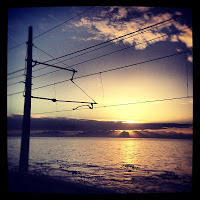 HP Lovecraft once wrote, “The sea can bind us to her many moods, whispering to us by the subtle token of a shadow or a gleam upon the waves, and hinting in these ways of her mournfulness or rejoicing. Always she is remembering old things, and these memories, though we may not grasp them, are imparted to us, so that we share her gaiety or remorse.”
HP Lovecraft once wrote, “The sea can bind us to her many moods, whispering to us by the subtle token of a shadow or a gleam upon the waves, and hinting in these ways of her mournfulness or rejoicing. Always she is remembering old things, and these memories, though we may not grasp them, are imparted to us, so that we share her gaiety or remorse.”The oceans of this world can swallow us, and sink us into the watery depths where monsters lurk and mermaids frolic. Or we can voyage far and discover new worlds. Selkies sing beneath the moonlight. The Flying Dutchman sails forever damned. Many-tentacled monstrosities drown unwary swimmers. Sunken treasures rest in wrecks shrouded in kelp and guarded by sea serpents.
 Be your tales wonder- or terror-filled, Dark Continents Publishing invites you to submit your previously unpublished short fiction of between 3 000 to 9 000 words that falls within the fantasy, horror, weird and science fiction genres. Payment rate is a flat rate of $20 per story. Closing date for submissions is June 21, 2013, for publication estimated in mid-2014. Mail your submissions attached as .doc file to nerinedorman@gmail.com with “The Sea” in the subject line.
Be your tales wonder- or terror-filled, Dark Continents Publishing invites you to submit your previously unpublished short fiction of between 3 000 to 9 000 words that falls within the fantasy, horror, weird and science fiction genres. Payment rate is a flat rate of $20 per story. Closing date for submissions is June 21, 2013, for publication estimated in mid-2014. Mail your submissions attached as .doc file to nerinedorman@gmail.com with “The Sea” in the subject line.
Published on March 24, 2013 00:34
March 20, 2013
In conversation with Dan Campbell
Dan Campbell, one of the Something Wicked volume #2 anthology authors is dropping by today. I totally recommend you get your copy on pre-order already.
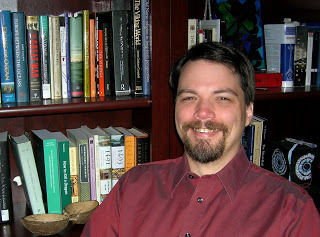
So, Dan, tell us a little about your short story for Something Wicked volume 2.
Redemption's Edge got sparked as I was working on character backgrounds for a novel. I needed to know the origin of Johnston's flaws, the weaknesses that fractured against his strengths. I'm reluctant to say much more, due to spoilers, but the story is a test of character.
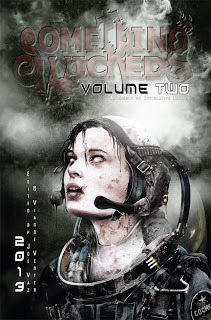 What gets you writing? Tell us a little bit more about your approach.
What gets you writing? Tell us a little bit more about your approach.Usually, I'll get gripped by a mood or an idea and then, if a plot connected to that occurs to me, I have a story (otherwise, it might end up as a poem). I tend to get material all in one go: an outline either of what could / should happen or a sense of the emotional points that must be hit. With that as a scaffold, I'll get to work on the story or the poem and flesh out the details. Writing something novel length requires me to also outline things as much as I can, but then follow one word to the next and hope I can either stay on target
or revise my course to suit things I didn't anticipate in the unfolding story.
What do you think are particular challenges associated with short stories as a form? As for longer works, do you have anything planned?
The thing that strikes me most about short fiction is the amount of time you have to get story-telling done. Quite simply, you don't have enough time. The story has to immediately engage the reader, to grab and hold their attention, and then it has to continue to pull them in. The writing never gets a chance to relax the way it can in something novel length, where a reader might keep reading just because they've gotten to know a character or they want to explore the world you're creating or some similar "let's explore this together" motivation. Of course, a good novel should also immediately engage the reader, hold their attention and continue to draw them - but the pacing in the two forms is quite different. Short fiction is liking getting a glimpse that stays with you forever, whereas the novel is like studying a scene until you can re-create it.
I have two novels in progress at present: the one with Johnston as a secondary character (which is on hold), and a newer one that I'm gradually working my way through, playing the game of writing according to my outline except when I change the outline to suit the story that gets written. Both are science fiction, with a focus on character development, emotion, and the consequences of choice and action.
What's the one short story or novel you keep going back to (we all have them), and what makes it stand out above all the rest?
I hate to sound cliche, but: The Lord of the Rings . I read it during a formative time in my life, and absorbed a lot of the values and culture portrayed in the books. I've since gone on to study Old Norse literature in my spare time, so Tolkien's work has a lot of resonance for me, now that I understand the source material he was drawing on. Tolkien blended heroic ideals with modern sensibilities in a way that I find offers a sense of depth, of history, of being rooted in tradition while adapting to the winds of change that drive the present.
What scares you?
Losing control, especially due to illness or insanity - becoming a captive in one's own body (or mind), unable to choose how one acts.
Thanks for stopping by, Dan! All the best!
Follow Dan's blog here...
Published on March 20, 2013 22:44
Four and Twenty Blackbirds by Cherie Priest
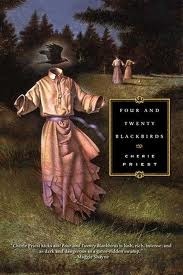 Title:
Four and Twenty Blackbirds
Title:
Four and Twenty Blackbirds
Author: Cherie Priest
Publisher: Tor, 2005
Stories set in America’s South always have a way of gripping me viscerally. I don’t know whether it’s a combination of the history or the mystery, or it’s a bit of both. This is the first novel by Cherie Priest that I’ve read, and I’ve definitely fallen in love with her voice, and will go on to read more of her works.
Eden’s always seen ghosts, and we follow her progress as she’s raised by her aunt, and her family life is far from simple. There’s a larger mystery in the picture, but Eden’s got a fair amount of delving to do before she uncovers all the secrets, even if it means traipsing through abandoned buildings or visiting forbidding relatives, with a murderous sibling on her trail.
I don’t want to give too much away. Essentially, this is a haunted tale of dark magic and a frightening inheritance. Priest hints at secrets that are never fully explained, which I absolutely love, because she allows readers to wonder. Her descriptions are lush, and I could feel the oppressive heat and smell the oozing rot of the swamp. Characters are deliciously ambiguous, neither wholly good or bad, though I have to admit that the primary antagonist sent delicious shivers down my spine.
To a degree it can be said that the story is slow-moving, but that didn’t bother me because I have a great love of tales that take their time to make me feel as though I’ve been wholly immersed in a particular world. Priest does very well in establishing a sense of place, which my inner travel writer totally appreciates.
Also, what stood out for me was Priest’s action sequences. She makes the combat scenes jump into vivid life with a ring of authenticity. Characters stumble and fumble, and there are consequences to their actions. If you’re looking for a story with a more than healthy dollop of voodoo, and well-realised non-Caucasian characters then give this one a shot.
Published on March 20, 2013 03:52
March 18, 2013
In conversation with Faith Bicknell-Brown
Today I've got Faith Bicknell-Brown, one of the Something Wicked Volume #2 anthology authors visiting. Welcome, Faith, pull up a hot seat for a little Q&A...
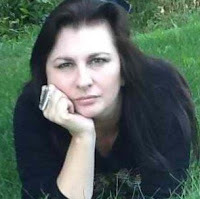 Tell us a little about your short story in the anthology.
Tell us a little about your short story in the anthology.My story is called Trashcans. It’s about a young man named Toby, who is under his older sister’s guardianship. He’s on the verge of becoming eighteen and he can’t wait to get away from her. Vanessa is controlling as well as verbally and emotionally abusive. Everything culminates one night when she forces him to take the trash out to the curb. Toby discovers “help” can manifest in unexpected ways.
What gets you writing? Tell us a little bit more about your approach.
I write nearly every day from about 8am until 3pm. Once my feet hit the floor in the mornings, the first thing to get me going is several cups of strong, black coffee and reading email. After that, I open whatever manuscript I’m working on and start writing. There’s either rock, pop or bluegrass music playing in the background. Sometimes if I find one of my favorite programs on one of the history channels, I’ll listen to the dialog as I write. I find many odd things from history to science very inspiring.
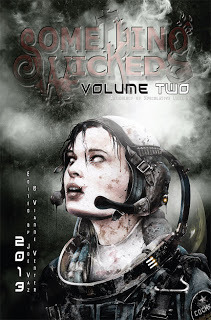 What do you think are particular challenges associated with short stories as a form? As for longer works, do you have anything planned?
What do you think are particular challenges associated with short stories as a form? As for longer works, do you have anything planned? With short fiction, a writer must deliver the plot and characters in as short a word count as possible without skimping on plot and characterization. However, I still find readers saying, ‘I wish this story had been longer.’ That’s frustrating to read or hear, but short fiction is just that—short.
And longer works? Well, I’m currently working on a new novel. It’s paranormal with some horror and sci-fi elements woven into it.
What's the one short story or novel you keep going back to (we all have them), and what makes it stand out above all the rest?
One I’ve read by another author is The Truth about Unicorns by Bonnie Jones Reynolds. It’s historical horror and fantasy. The atmosphere and style of the novel, plus how the author blended magic and witchcraft, sucks me in every time I re-read it. It’s an old book that’s out of circulation, but I managed to find an autographed copy for my bookshelves.
However, when it comes to my material, my favorite would be my novel my agent has been holding on to called Moone Spell. It’s about a werewolf curse accidentally placed on a man because his wife wanted him to be home more often. The heroine has escaped from a sadistic ex-husband, so she faces him and the werewolves in an effort to protect her children and find true love.
What scares you?
If you mean typical jump-out-of-your-skin topics, it would have to be snakes. I hate 'em. I can’t even stand to watch anything about them on TV or to come across a picture of one in a book!
Linkage:
www.facebook.com/faithbicknellbrown
www.facebook.com/flbicknell
www.twitter.com/flbicknell
www.myspace.com/faith_zinnia
www.pinterest.com/flbicknell
www.authorgraph.com/authors/FLBicknell
Published on March 18, 2013 22:58
Five minutes with Aleksandr Voinov
I've been a fan of Aleksandr Voinov's writing from the moment I encountered one of his short stories in an anthology that I reviewed.His writing carries a dynamism I felt was often lacking in a lot of the m/m fiction I'd encountered. We fell to chatting via Goodreads and, since then, I've eagerly reviewed not only his offerings, but also the titles brought out by his publishing company, Riptide Publishing. So of course today I'm absolutely thrilled to have Aleks here today for a little Q&A.
The first thing that struck me about your writing was the intensity of your characters' emotions. They live and love fiercely, and sex is often tangled with a degree of power play. I get an idea of how masculine love is very different compared to the love between a man and woman. Care to elaborate?
Hah, good question. In my writing, I am interested in matters of power, hierarchy, and that delicious dance of who comes out on top, both sexually and otherwise. I think men are socialised more to be competitors, to be aware of status, and another man always presents a challenge and a question: Can I bend him to my will? Who will come out on top? In this case, we’re talking mafia characters, who are even more neurotic about status and power and influence than is normally the case. To them, it’s literally a matter of life and death.
Given how sexist our society is, women don’t usually appear as competitors on a man’s radar, in my experience and observation (since woman do compete, that can be a tragical oversight, especially since women wield power differently but no less efficiently). In story terms, hierarchy and power games absolutely increase the stakes and the emotions of characters. These people compete hard, they play hard, they party hard, and we can almost expect to see them go down in a blaze of (dark) glory, as it were.
You're a stickler for the detail, and that's part of what I feel gives your writing a ring of authenticity. I get the idea that you do *a lot* of research. Can you share a little about the process that goes into preparing to write a historical setting? What gives your stories that extra punch?
Details are really everything. They can trigger turns and twists of the story, they deepen character, and they allow readers to relate and see things. If I write about a killer, I do need to know the brand of pistol he uses, and why he’s chosen that. That alone reveals character. Is it aesthetics? Handling? Sentimental reasons? I need to know these things, and often my characters tell me once they’ve started to come alive.
When I start anything, I get a pile of books. I’m in “accumulating” mode, I just buy everything I can get my hands on and then read a lot, make notes, put the telling pieces and the useful stuff into a folder or paper notebook and take it from there.
Setting suggests character—there are some settings that cry out for a specific character type or profession—and ingrained in that is the question of the central conflict/central experience. A nurse will have a very different experience/conflict than a soldier s/he cares for. Slowly, by understanding the world and how it’s different from ours, it becomes three-dimensional and comes to life in my head.
I even get a sense of “owning” it, as if I could move freely in it. Of course, it’s not the real place, but rather my interpretation of it. Giving an unbiased view is really the historian’s job; I just try to tell a good plausible story in a setting that comes alive for the reader. But first it has to come alive for me, and that means I need to know it like I lived there, or very nearly so. Which makes me a very slow historical novelist and slightly neurotic about details. But as much as I struggle and curse, it’s usually worth it. It just makes for a deeper experience for the reader, because by mastering the details, I essentially show them they can trust me to not lead them astray. And that trust relationship is very important.
 Your body of work is already quite considerable. For those who're just embarking on dipping into your writing, where do you suggest they start, and tell us a little about those works and your mind space when you were writing them.
Your body of work is already quite considerable. For those who're just embarking on dipping into your writing, where do you suggest they start, and tell us a little about those works and your mind space when you were writing them.Considering how diverse they are, that’s a bit of a challenge, since I do hop madly from genre to genre. Maybe two of the best examples (and recent, so the writing is good) are Skybound and the Dark Soul series. They really couldn’t be more different.
Skybound is a “literary”, fairly subdued little story about a mechanic and a fighter pilot falling in love. No big deal, but these are the closing days of the Second World War, and they are Germans and hence on the losing side. To dare to love under those circumstances, that does take quite a bit of courage.
I didn’t actually want to write that story, especially since it’s first person and present tense (which I’d never done before), but it simply came over me in the middle of a pile of projects and demanded to be written. The research was pretty humungous, too—I knew nothing about German fighter planes, and even less about the guys who flew and repaired them. It’s not a story about Nazism or atrocities; it’s two guys trapped in a bad situation and finding ways to deal with it.
Dark Soul, by contrast, is more of a Quentin Tarantino movie, just with a little less ultraviolence. Much bolder, starker lines and colours than Skybound. It stars Silvio Spadaro, a young mafia killer whose sexuality (even gender expression) is pretty ambiguous. He’s hedonistic and inscrutable, sexy, deadly, and vulnerable at the same time. It’s mostly told from the view of Stefano Marino, a young mafia boss who’s married and in love with his wife Donata, a bit of a yuppie and an odd fish himself. He’s fairly educated and refined for a Mafioso, for one, and he has a bisexual streak he’s battling and eventually comes to terms with. Obviously, things go to hell when the Russian mob gets involved, leading to a spiral of events that eventually has the law stomping down on the mafia—hard. There’s plenty of sex and intense emotions, so maybe describing it as the “gay Godfather” works, although the mood is very different.
Writing Dark Soul was a bit of a trip, to be honest. Silvio came into my life about twenty years ago, and during those years I’ve tried to put him into a book, but all those attempts failed (at least they kept failing better every time). Dark Soul is me not failing at tackling that character, which makes me very proud. It was also a qualitative jump for me. Any author who’s been around for a while runs into the danger of getting complacent, and I think I was that. Then I wrote Dark Soul, and while writing it, I really had to stretch and work hard, and then I got a gifted editor with Rachel Haimowitz, who beat the remaining laziness out of me. The end result was a new level of writing, where “good enough” is no longer satisfactionary. I do want to be the best writer I can be, and with the right editor who calls me out on bad habits, that’s more likely to happen.
You're kinda crazy like me because you wear the publisher hat in addition to the author hat (okay, granted, I wear the editor hat and that's pretty much the same level of insanity). How on earth do you do it? (And I know you're employed full-time in corporate hell too.)
I don’t watch TV, really, and my social life is pretty much limited to meeting friends every now and then for coffee or lunch. What time I have, I use extremely efficiently, and being a bit of a workaholic does help. On the publisher side, I’m also fortunate in that I’m being backed up by a fantastic team. The day job is editing in financial services, so I’m quite adept at sneaking in my own edits during lulls in the workflow, when colleagues shop for stuff online or go for extended coffee breaks. But yeah, I think I can sustain this for maybe another three to five years and then something has to give. Ideally the day job. I’m quite hopeful that I might be able to get the same income from doing things I love than from editing financial analysts whose grasp of the English language or good style is not always perfect.
What annoys you the most about the chosen genres which you write and publish? What are some of the common pitfalls that you've seen over and over again? What would you like to see more of?
Oh, it annoys me when authors don’t take pride in their work. I’ve once had a fight with an author who complained on a mailinglist about a negative review. Curious as I am, I went to the review site and read the review, which was cogent and gave lots of details about how the research of that hetero romance story was wrong. The author initially claimed her research was correct (which was a lie, considering both the reviewer and I knew a thing about what she’d been writing about), then, when it was proven to her step-by-step that even a fifteen-minute browse on Wikipedia would have caught 99% of all her mistakes, she blew up and said, “Oh come on, people. This is romance! It’s not like it’s a proper book!”
At which point, that author was dead to me. I mean, there is something like professional pride, and I think we owe our readers to do our best every time we sit down and put our fingers on the keyboard. And research is absolutely vital. Everybody makes mistakes—I know I have—but such blatant disregard for what you’re doing I find extremely hard to understand (which is my diplomatic way of saying I find it inexcusable). Why should romance be any less good, in terms of craft, research, editing, than any other genre out there? So, yeah. Attitudes like this have me spitting nails, both as a publisher and as an editor, let alone as a fellow author in a genre that is widely regarded as “trash” by the mainstream. If we don’t treat what we do with seriousness and respect, then we’ll never shed the reputation of being cheap hacks writing and publishing awful books for the id of barely-literate readers.
Now, for the less serious stuff...
What three novels do you keep recommending to folks?
Light in August by William Faulkner, Theft: A Love Story by Peter Carey, and American Psycho by Brett Easton Ellis for “literary”. In our genre, I’d recommend Angels of the Deep by Kirby Crow, also The Song of the Fallen books by Rachel Haimowitz, and Santuario by GB Gordon. All three of those really pushed the bar upwards. In terms of general speculative fiction, I’d absolutely include Erekos by A M Tuomala.
And movies? Which ones do you keep returning to?
I have a soft spot for Gladiator, which I keep re-watching. Other favourites are The Lives of Others, which had me crying like a dog on a plane trip, and recently I loved Django Unchained.
Music? Do you prefer absolute silence while you write or do your stories have soundtracks?
I always work with music. Loud music helps shut down the critical voice that tells me whatever I’m typing is crap. It does help me hit the flow and just write.
Destinations? Have you gone to the places that occur in your stories, or do you have a wishlist?
I love travelling, and I’m usually writing about places I’ve been. London features prominently, since I live just outside and work in the Great Beast, and other places like Paris, Rome, Berlin feature. However, I’m always happy to expand my inner reference catalogue, so I’m trying to travel whenever possible. The wishlist right now has several places in the US (New York City, Denver, Antelope Canyon) and I’d love to see some places in the Middle East (like Damascus and some crusader castles), Egypt and then the Far East, like Hong Kong or Thailand. I just need more holidays!
What's on your desktop at the moment with regard to a WiP (or is it a state secret).
A pile of edits, mostly. Right now, I’m working on a historical novel set in Paris during the German occupation and the sequel to Scorpion, my dark gay military fantasy novel, both of which should get wrapped this year, finally, after many delays and crises of confidence.
Linkage:
Twitter: @aleksandrvoinov
Website: www.aleksandrvoinov.com
Blog: www.aleksandrvoinov.blogspot.com
Published on March 18, 2013 00:12



